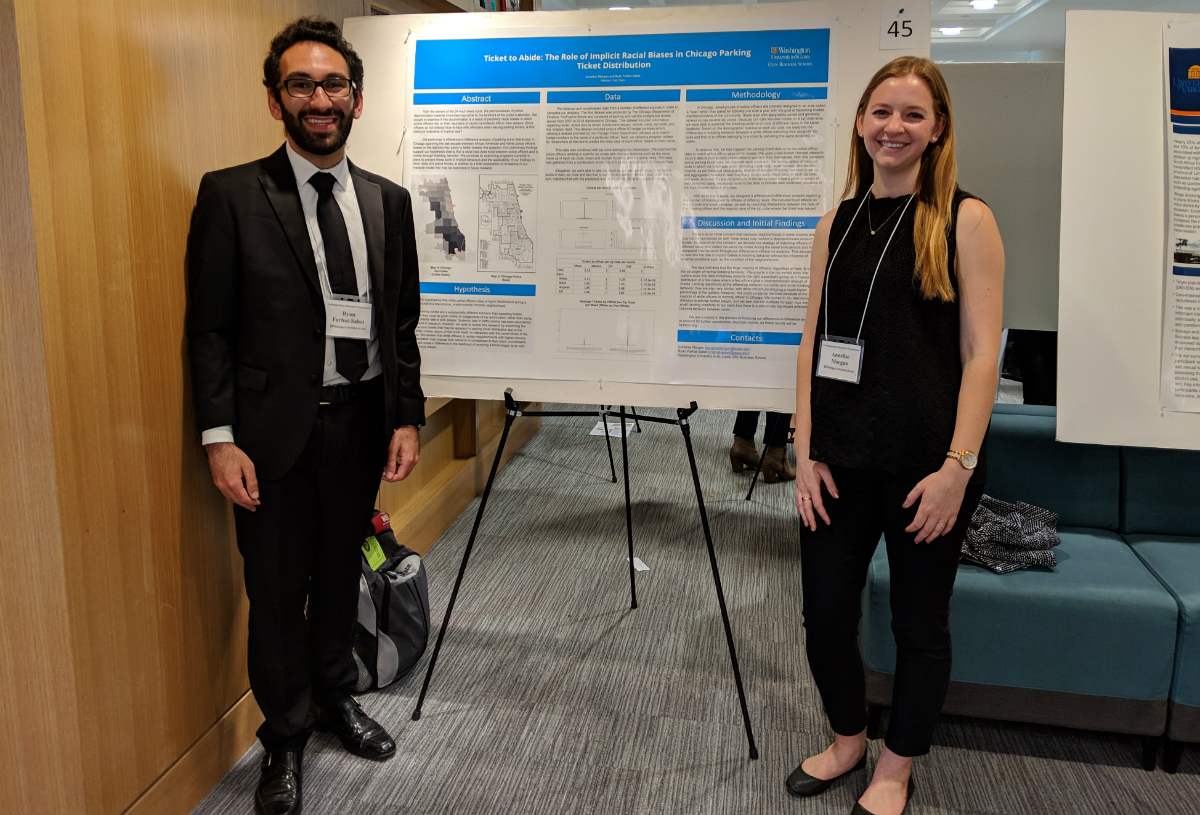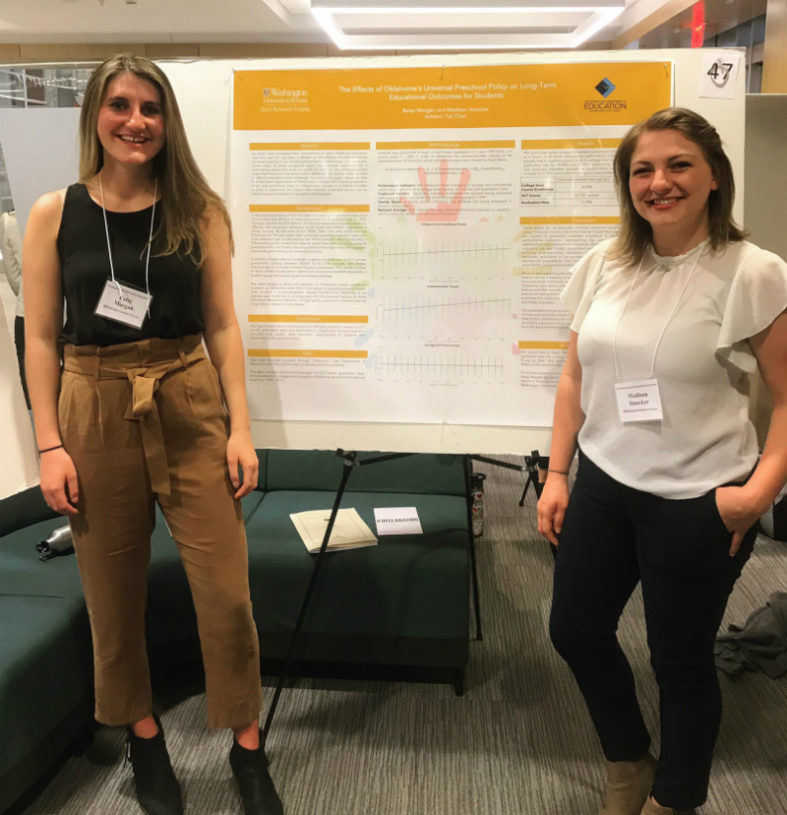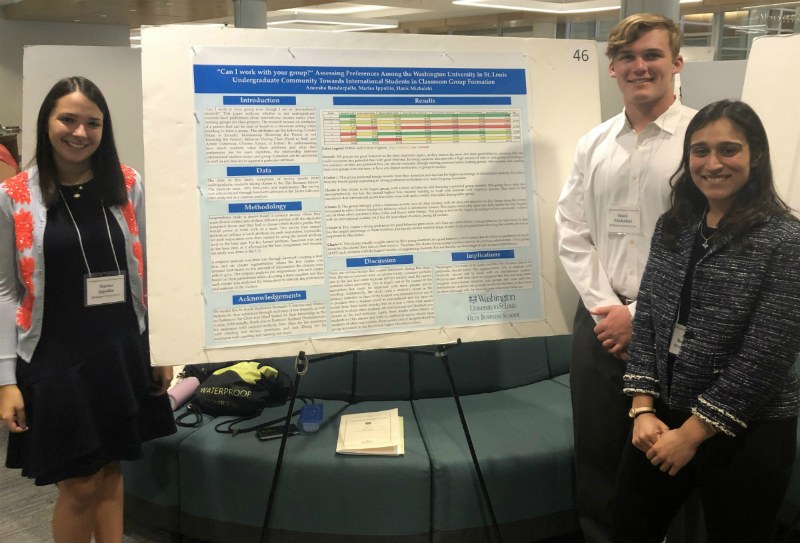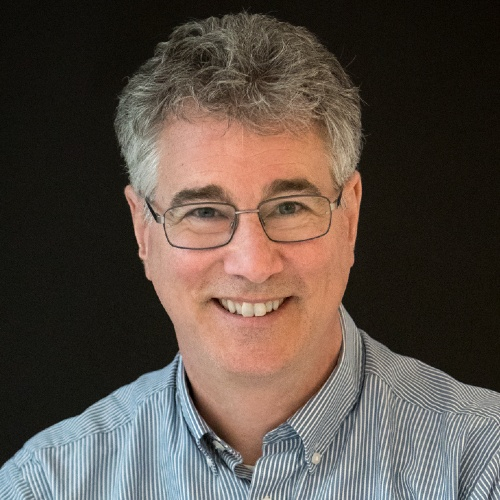Intense research challenges BSBAs in honors course
- July 29, 2019
- By Kurt Greenbaum
- 4 minute read

In early spring, Betsy Morgan spent five hours on the phone with Bob Harbison as he dictated four years’ worth of preschool enrollment numbers from Oklahoma’s 77 counties. Harbison, a retired early childhood education activist, was the only person on earth with the data Morgan sought—and he wasn’t about to let it out of his sight.

Thus began the extended two-day phone call with Morgan, BSBA 2019, as she gathered data for her project in Management 490. The elite, yearlong honors seminar is offered by invitation only to top undergraduates eager to take a deep plunge into research methods—a capstone course that only seven students took in the 2018-19 academic year.
“I wanted to spend my senior year creating a piece of knowledge, working with someone I could trust,” Morgan said. “It was a lot of work. There were times when I said, ‘Why did I do this?’ But I feel retroactively proud that we did it.”
Morgan partnered with another 2019 graduate, Madison Stoecker, on a project to measure the long-term educational outcomes for students in Oklahoma’s universal preschool program—a program that’s drawn considerable press over the years. But, Morgan and Stoecker said, it hadn’t been analyzed for its effectiveness.
Ironically, the marathon data-dictation session didn’t provide useful data for their project. But the pair’s research unveiled good news for the state’s program: Students’ average ACT scores showed a statistically significant increase for all counties in Oklahoma. For lower-income counties, the effect was 50 percent higher than the average.
Morgan and Stoecker’s project was one of three that seven BSBA students took on in the course. “These are students who have excelled and demonstrated their ability to do independent work in close consultation with some of our most rigorous researchers,” said Bill Bottom, the Joyce and Howard Wood Distinguished Professor of Organizational Behavior and one of four professors who tag-team the course.
Marisa Ippolito, Hank Michalski and Aneesha Bandarpalle partnered on a paper examining the way teams are formed—and the dynamics when international students are involved in forming teams. Annelise Morgan and Ryan Farhat-Sabet dug into data from the Chicago Police Department to examine the effects of implicit racial bias in the distribution of parking tickets.
In the team project, the students analyzed data they collected from a survey of 229 students in an on-campus lab. They found that people want to work with people who are similar to themselves—regardless of whether they were American or “international.” But mostly, students wanted to work with teammates who practiced “good behavior” as a teammate in class. They recommended that professors always assign students to groups to avoid built-in bias against international students.
In the Chicago parking ticket project, students found no clear trends beyond the fact that white police officers tended to be biased in how they ticketed in different ZIP codes: White officers were less likely to ticket in white areas than in black or Hispanic areas.
The cadence of the course
Students in the course spend their first semester rotating among the four professors: Bottom; Tat Chan, professor of marketing; Bernardo Silveira, assistant professor of economics; and Ohad Kadan, H. Frederick Hagemann, Jr. Professor of Finance and Vice Dean for Education and Globalization.
Each introduces students to a different aspect of the strategy and techniques for academic research. Throughout the semester, the students look for research topics that pique their interest and consult with the instructors to hone their topics.
“These are rigorous, empirical projects,” Chan said, “Science in general is sort of a team sport. They each do one proposal for each faculty member and as a group, we discuss the merits of each of these proposals for projects.”
It’s very entrepreneurial. I don’t suggest topics. They come up with their projects. It’s hard to find that at the undergraduate level, with this level of maturity and sophistication.
Bernardo Silveira
‘Unbelievable experience’
Why would senior BSBA students spend their final year in such a grueling course when they could be coasting toward graduation?
“Challenging yourself and being intellectually curious just for the sake of being curious is very underrated,” Farhat-Sabet said. “We’re still focusing on ourselves through this project, but it’s a different side of ourselves. It’s a challenge for sure, but I can say I’ve had this experience.”
And while their projects might not appear on the surface to have any direct bearing on their business school education, the students all appreciated the applicability of their work to the careers they were about to begin.
With graduation behind them, the seven students are all dispersing to new jobs in the next few weeks. Ippolito will be a consultant with Deloitte starting September 30 in Cleveland; Michalski starts August 19 as a category specialist for Jet.com in Hoboken, New Jersey; Bandarpalle will be a consultant with McKinsey & Company in Chicago starting August 9.
Morgan will be a consultant with Deloitte in New York; Farhat-Sabet is moving to Washington, DC, to work for boutique tech consulting firm CapTech.
Stoecker starts September 27 with McKinsey in Chicago; Morgan starts today at Boston Consulting Group.
“It was an unbelievable experience,” Ippolito said. “It was experiential learning and to have help from our advisers—you don’t always have that perspective.”
Pictured at top: Annelise Morgan and Ryan Farhat-Sabet, BSBA 2019, present their work on bias in Chicago parking tickets from their honors thesis course.
Seven students, three major projects
Marisa Ippolito, Hank Michalski and Aneesha Bandarpalle, BSBA 2019.

Media inquiries
For assistance with media inquiries and to find faculty experts, please contact Washington University Marketing & Communications.
Monday–Friday, 8:30 to 5 p.m.
Sara Savat
Senior News Director, Business and Social Sciences
